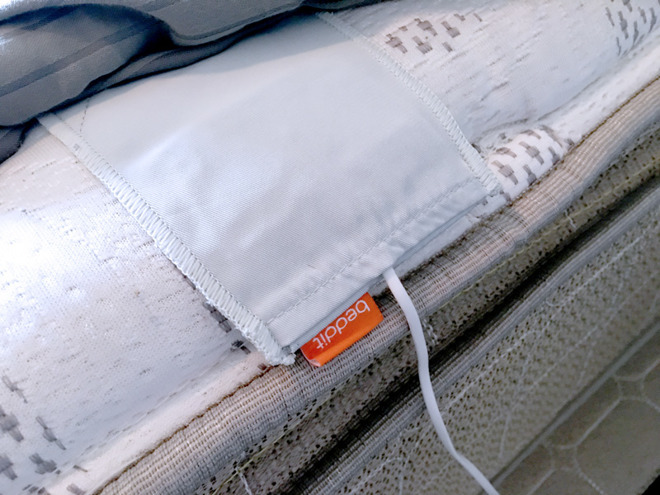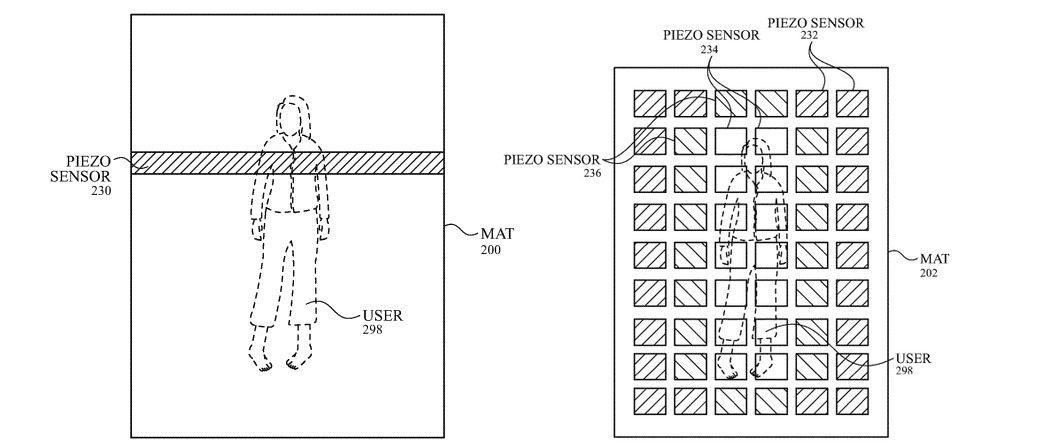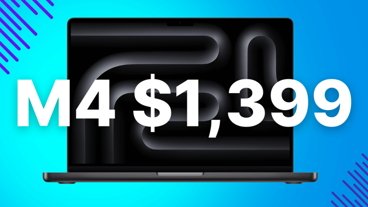Apple is interested in improving its Beddit product line and helping its customers get healthier by sleeping better at night by monitoring their movements throughout their slumber, but without the bulk of existing medical monitoring systems, by considering the use of piezo sensors laid on top of a bed.
Apple is known for offering wellness-related features in its products, but the vast majority are meant for use while the user is awake and active, such as with the Apple Watch or the iPhone's Health app. Outside of limited sleep tracking through Apple's Bedtime function for iOS, there is little Apple itself actually offers to users for tracking during sleep.
Apple does own the sleep tracking company Beddit, acquired last year, which does offer a band that lies on top of the bed for monitoring a number of elements, such as heart rate, respiration, room temperature, and time spent sleeping. Even so, it appears the existing system can be improved according to one recently-filed patent application.
Filed on May 22 and published November 22, the application for a "multi-element piezo sensor for in-bed physiological measurements" aims to go further by keeping track of the user's movements throughout a sleep cycle. While other sensors could be used to monitor other elements, the core of the idea is the use of a piezo film on the bed's surface, which can be used to measure the person's contact points with the bed and, using multiple film layers, pressure exerted.
Two versions of the idea are offered, with the first mimicking the Beddit sensor, in being a thin strip that crosses the bed roughly where the chest of the user is positioned.
A second involves a larger array of sensors that covers the entire bed in a grid, with sensors divided up into separate cells. While larger overall, the larger number of monitored sections can allow for other elements to be sensed, such as the way the body lies on the bed, and if there are any particularly heavy spots where there is more pressure on the bed than typical.
According to the filing, the piezo film could be corrugated to have "peaks and valleys" to create localized regions that are more sensitive to force. The disturbances of these areas, namely the flattening or compressing of each fold, could offer more data than a flatter film layer.
It is unclear if the patent was influenced by Apple's ownership of Beddit, but the chest-height sensor concept is already employed in the Beddit 3 sensor system. It is unknown if that particular product already uses a piezo film, but an addition of the element may offer more data for the iOS companion app to work from.
This is not the only patent or application Apple has made in relation to sleep tracking, One patent granted in June and refined in a separate application in November describes how the use of devices could force an alarm system to change when it rings, to allow users a full night's sleep.
 Malcolm Owen
Malcolm Owen








-m.jpg)






 Christine McKee
Christine McKee


 Sponsored Content
Sponsored Content

 Amber Neely
Amber Neely











12 Comments
For most of us, exercising, an improved diet, not eating before bed, and not having electronics flashing their lights and sounds in our bedroom will resolve the vast majority of sleep-related issues, but I love hard data and there are always the outliers, so bring it on, Apple.
I even removed the last remaining light from my bedroom by replacing the digital alarm clock with an Echo Dot. Sure, the Dot has lights on it, but they only light up when you activate it.
PS: Until Apple comes out with a solution I prefer this app for my Watch to monitor my sleep quality and habits.
I may be stating the obvious here...but for good mental health, a good night's sleep is imperative.
Then diet, then exercise, where exercise helps to sleep better! :)
I applaud Apple for their emphasis on health and fitness. My daughter's a doctor and she says 95% of the patients are in her hospital are there b/c of bad life-style choices, essentially from a horrendous diet!
Anyway on that lovely note...Happy Thanksgiving everyone. :)
Best.
No television, and no reading at least half an hour before bed. Does the trick for me.
Oh, and skipping that slab of cheese before turning in also helps.
They recently asked me for specific feedback as related to potential sleep tracking features that I would find useful, so it seems they are starting to focus quite deeply now in this area which I’m glad about, and frankly it’s about time too!